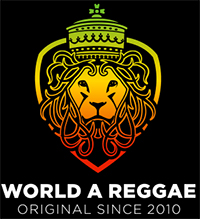Jamaica has always been the beating heart of reggae and dancehall, but lately, there seems to be a noticeable shift. More and more Jamaican artists are crossing borders—not just for tours, but to create their music. With European and American producers becoming key players in crafting reggae tracks and distribution, we could be left wondering: is this a natural evolution, or is Kingston losing its grip as the epicenter of reggae’s creative pulse?
At World A Reggae, we’ve been observing this trend for a while now, but the conversation was reignited by a recent video from Kevin Salmon, also known as DubSchool, a critical vlogger on Reggae topics and brother of Kabaka Pyramid. His insights in his recent video shed light (to be taken with a pinch of salt) on why this is happening and what it means for the industry. While we refrain from naming specific artists and producers who work abroad—we like to be objective—this article aims to explore the broader implications of this shift.
Kevin Salmon: “We Need to Fix the Foundation”
Kevin Salmon didn’t hold back in his analysis of what’s holding Kingston’s music scene back. In his video, he identified a critical issue: the lack of new production hubs in Jamaica. When asked Kevin why he said what he said he told World A Reggae:
“I created this clip because I’ve come to understand a major issue facing the reggae industry in Kingston: the lack of new production hubs,” Salmon begins.
“Too often, artistes are selling their songs for chump change, prioritizing quick cash over long-term sustainability. Many don’t have systems in place to track royalties or, worse, lack interest in doing so. This short-term mindset not only undermines the value of their work but also impacts the overall quality of the music. In the rush to make a quick sale, little attention is given to how the song sounds in its final form.
“This cycle is stunting the growth of the reggae industry and discouraging the development of production hubs. Without a foundation that values artistry, professionalism, and financial foresight, the opportunities to grow and innovate are limited.”
Salmon’s video struck a chord, bringing attention to issues many have quietly observed for years. He offers a solution that focuses on education, urging artists to:
• Value their work.
• Track their royalties.
• Shift their mindset from short-term gains to long-term sustainability.
Why would Jamaican Artists Produce Abroad?
It’s easy to see the appeal of working with international producers. From state-of-the-art studios to bigger budgets, the resources available overseas often might outshine what’s accessible in Jamaica. But it goes deeper than just equipment and money.
1. Global Reach
Collaborating with European or American producers puts Jamaican artists on the radar of wider audiences. It’s not just about making music; it’s about creating a product that resonates globally.
2. Creative Fusion
Reggae has become a global genre, with non-Jamaican producers adding their own flavors to the mix. This fusion can be exciting—think reggae mixed with EDM, Hip-Hop, Afrobeat, or even trap. It’s fresh, it’s innovative, and it’s pulling in new fans.
3. Challenges at Home
This could be the hard truth: Kingston’s music infrastructure isn’t keeping up. As Salmon highlights, the lack of sustainable production hubs and a “quick cash” mentality are holding the industry back. If artists don’t see a future in Jamaica, they’ll naturally look elsewhere to grow.
4. Quality Control
Overseas producers often bring a level of polish to the music that appeals to international markets. It’s not that Jamaican producers lack talent—they don’t!!—but the focus on quick turnover often limits the time and care put into creating timeless tracks like back in the days.
The Future of Kingston’s Music Scene
While this trend could open new doors for artists, it also presents risks for Jamaica’s music identity. If too much of Jamaica’s creativity shifts overseas, what happens to Kingston’s role as the heartbeat of reggae? What could happen to Reggae’s UNESCO heritage? What happens with all the knowledge from the elder artists and producers? There’s a thin line between evolution and erosion.
Salmon’s call for a stronger foundation at home isn’t just a critique; it might be a challenge too. How do we ensure the next generation of artists sees Kingston not just as the birthplace of reggae, but as its beating heart?
At World A Reggae, we believe the answer lies in uplifting Jamaica’s music infrastructure. It starts with valuing the work. Artists need knowledge and systems to track royalties, producers need resources to create quality music, and the industry as a whole needs to prioritize sustainability over short-term gains. Without these changes, the gap between Jamaican talent and its global production will only widen.
This article isn’t about criticizing artists or producers who seek opportunities abroad—it’s an observation of a trend that’s been unfolding for years: a lot of amazing roots reggae is created abroad. Kevin Salmon’s recent video simply reminded us of what’s at stake. Reggae belongs to the world, but its soul remains in Jamaica. We would love to hear your view on this topic.
(Watch Kevin Salmon’s full video on Instagram: Instagram Reel Link)


